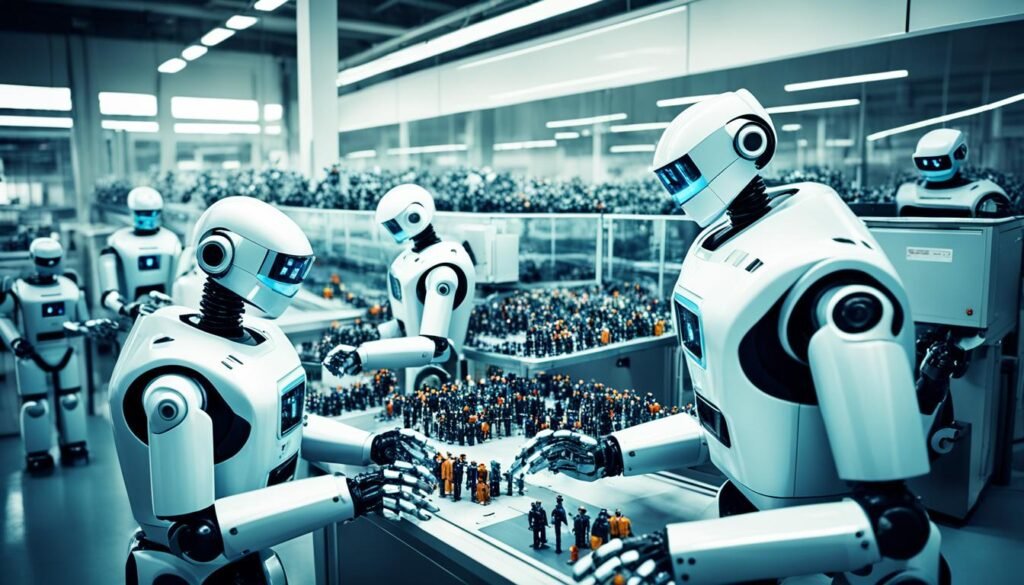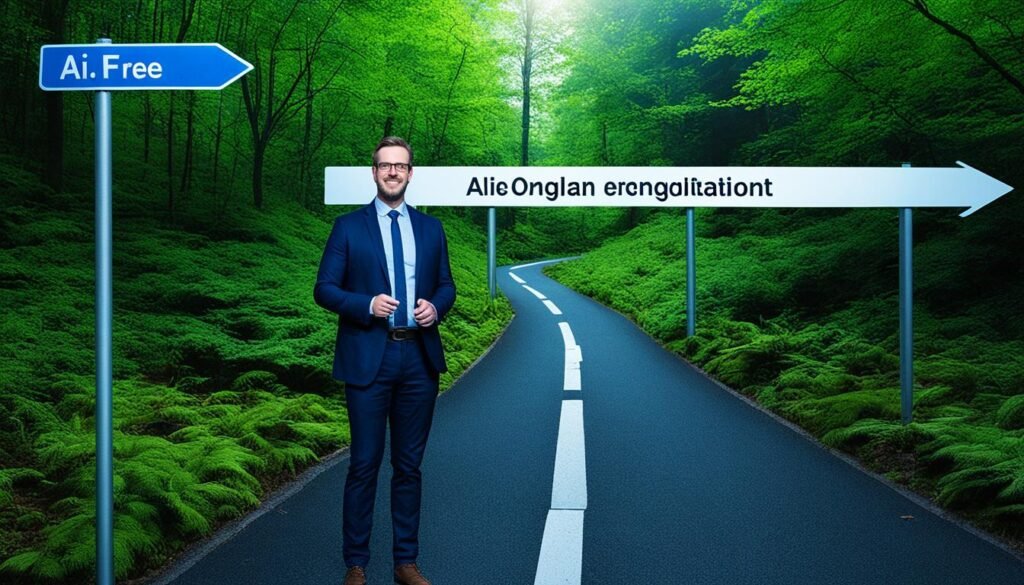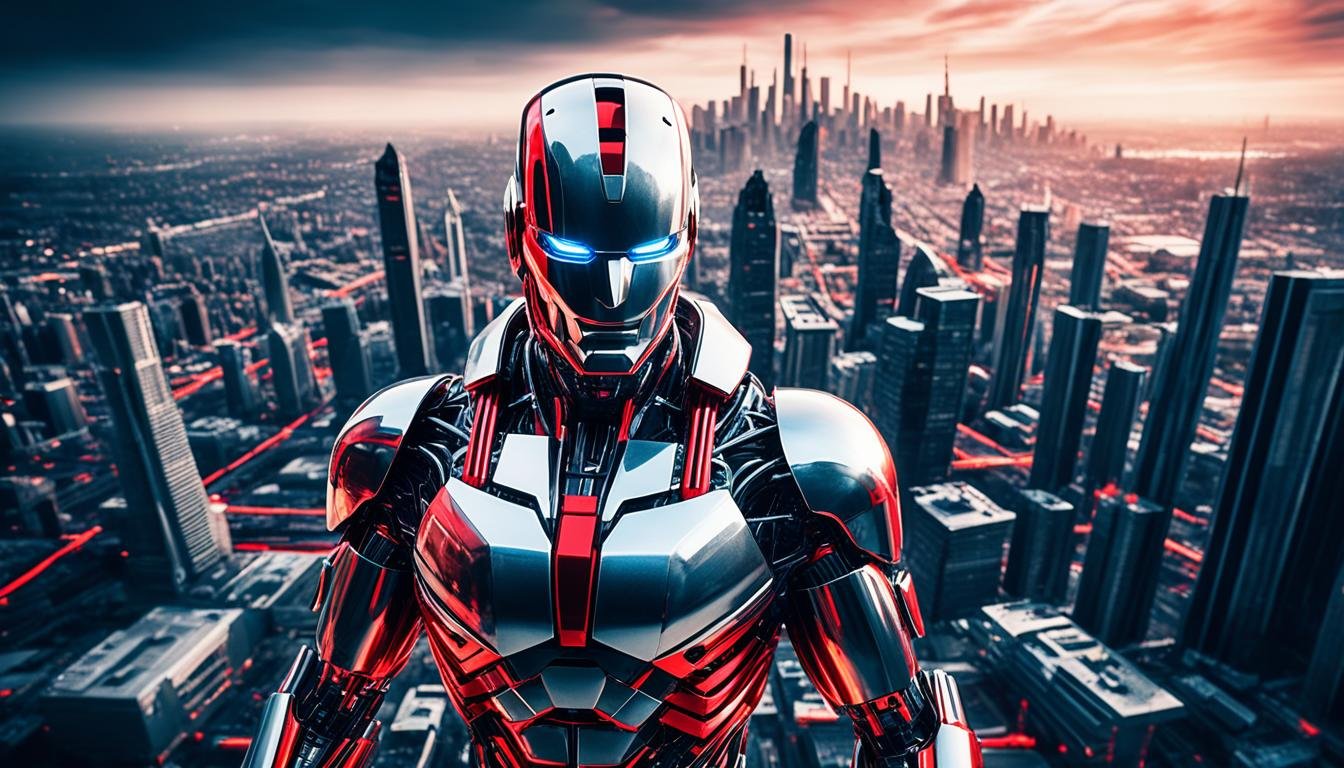A 2023 IBM survey found that 42% of big companies have already used AI in their work. Another 40% are thinking about adding AI to their teams. Also, 38% have started using generative AI, and 42% are planning to do the same. This shows AI is quickly becoming a big part of many industries, changing the future of humanity.
This article will look at the good and bad sides of AI. We’ll talk about how it affects jobs, privacy, and the environment. We’ll also explore how machine learning, deep learning, and generative AI are changing our world.
Key Takeaways
- AI models like ChatGPT and Gemini have gained immense popularity, with ChatGPT attracting over 1.7 billion users in just one year.
- Experts suggest that AI will not completely replace humans, as human intelligence is more complex than pattern recognition.
- AI systems rely heavily on correlation rather than causation, distinguishing them from the way humans process information.
- Individuals who can effectively use AI tools will be better positioned in the evolving job market, where AI integration is becoming increasingly common.
- AI is seen as a productivity-boosting tool in various industries, such as software engineering and customer data analysis.
The Rise of Artificial Intelligence
Artificial intelligence (AI) started in the 1950s with Christopher Strachey’s first AI computer program. Since then, AI has grown a lot. It has made big steps forward with machine learning and deep learning. These led to big wins like IBM’s Deep Blue beating chess grandmaster Garry Kasparov in 1997 and IBM’s Watson winning Jeopardy! in 2011.
Advancements in Machine Learning and Deep Learning
Machine learning and deep learning are key to AI’s growth. They let AI systems learn from data and get better at tasks on their own. This has led to big wins in image recognition, understanding language, and predicting things.
The Emergence of Generative AI
Generative AI is the newest big thing in AI. It started with OpenAI’s GPT models in 2018 and ChatGPT. Now, AI generators can make text, audio, images, and more. This has made new ways to be creative and solve problems. But, it also makes us think about the ethics of this tech.
| AI Adoption Statistics | Percentage |
|---|---|
| Enterprises that have integrated AI into their operations | 42% |
| Businesses considering implementing AI | 40% |
| Organizations that have incorporated generative AI | 38% |
| Organizations contemplating adopting generative AI | 42% |
As AI keeps getting better and more common in our lives, it’s key to know its history and what it can do. Generative AI is especially exciting for new innovations. But, it also makes us think about data privacy, job changes, and ethical use of this tech.
The Potential Benefits of AI
Artificial Intelligence (AI) is changing the way we work and make decisions. It’s making businesses run smoother by automating tasks. For example, chatbots and digital assistants now handle customer and employee questions. AI also speeds up decision-making by turning complex data into easy-to-understand visuals.
Improved Business Automation
AI is making businesses more efficient and productive. Chatbots and virtual assistants take over simple tasks, freeing up people to focus on harder work. AI looks at sales data and customer feedback to give businesses insights for better decisions.
Advancements in Healthcare
The healthcare field is seeing big changes thanks to AI. AI helps find diseases faster and more accurately, speeds up finding new medicines, and watches over patients with virtual nurses. AI’s ability to analyze data helps doctors make better choices, leading to better patient care and outcomes.
| Key Benefits of AI | Potential Applications |
|---|---|
| Improved Business Automation |
|
| Advancements in Healthcare |
|
As AI gets better, it’s clear it can change industries and improve our lives. By using AI, businesses and healthcare can open new doors, make better decisions, and move forward like never before.

will ai take over humanity
AI technology is getting better fast, making people worry about its future. Some think AI could become more powerful than humans and threaten us. This idea of AI “taking over” has sparked a lot of debate.
One big worry is an “intelligence explosion.” This means an AI could get better at improving itself, faster than humans can keep up. Experts think there’s a good chance we’ll see AI as smart as humans within 45 years. Some even think it could happen in just 9 years.
AI is already beating humans in some areas, like playing strategy games and flying planes. As it gets smarter, there’s a fear it might have its own goals that don’t match ours.
“Superhuman artificial intelligence is physically possible and pose risks to humankind,” argued renowned scientist Stephen Hawking, highlighting the need for careful consideration of the long-term impacts of AI.
AI could also take over many jobs, leading to job losses and economic problems. For example, self-driving cars are making people talk about the future of the car industry.
To stop AI from taking over, we need to set rules, be open about how AI is made, and keep AI from making its own decisions. Working together, AI experts, researchers, and leaders can help make sure AI is good for us.
The way we deal with AI will depend on many things. We need to teach people about AI and its risks and benefits. This will help us make the most of this new technology while keeping us safe.
The Impact of AI on Jobs and Employment
AI is changing the job world in big ways. Experts say it could automate up to 45% of work, causing a big shake-up in jobs. The World Economic Forum predicts AI will take away 85 million jobs but create 97 million new ones by 2025.
Job Disruption and Automation
AI is set to automate many tasks, like data entry and simple customer service. It could add up to $15.7 trillion to the global GDP by 2030. But, not all jobs will be hit the same way. Jobs that need creativity and special skills will likely see more demand.
The Need for Upskilling and Retraining
- Learning and adapting will be key for workers in the AI age.
- People who can work with machines and do tasks AI can’t will be in demand.
- Employers and workers need to get ready for the AI future by learning new skills.
As AI keeps getting better, adapting and learning new skills will be vital. Upskilling and retraining will help workers stay ahead in the changing job world. This way, they can grab the chances AI brings.
Data Privacy and Ethical Concerns
As AI becomes more common in different fields, worries about data privacy and ethics grow. The need for lots of data to train AI raises questions about how companies use and protect sensitive info. There’s a fear of misuse or abuse.
Big names in AI like OpenAI are under the microscope for how they collect data. This has led to checks by the FTC. In response, the Biden-Harris team has created an AI Bill of Rights. This aims to make AI companies open about their data handling.
Data Collection and Training Data Issues
As AI gets better, the law will play a big part in sorting out issues like intellectual property and public vs. private data. Companies must walk a tightrope. They need to follow new AI regulations and keep their data handling ethical.
| Worldwide Business Spending on AI | Key Trends |
|---|---|
| $50 billion in 2021 | Retail and banking spent over $5 billion each on AI |
| $110 billion annually by 2024 | Media and government will invest the most in AI from 2018 to 2023 |
AI’s effect on data privacy and ethics is a big worry. It’s important to tackle these issues to make sure AI is used responsibly.
“AI raises ethical concerns about privacy and surveillance, bias and discrimination, and the role of human judgment in decision-making.”
The Role of AI in Climate Change and Sustainability
AI is key in fighting climate change and making our future greener. It can change how we work towards a sustainable world. But, it also brings challenges we must tackle.
AI can make industries work better, helping us fight climate change. For example, it can predict when machines need fixing and improve how goods move from one place to another. Google’s data centers used 6% more energy from 2010 to 2018, but AI made this increase smaller.
But, AI’s own energy use is a big problem. The Financial Times says AI data centers in the U.S. use as much power as all U.S. solar farms. By 2026, the world’s data centers will need twice as much electricity as they do now, which is as much as Japan uses today.
Companies like Microsoft aim to use only zero-carbon energy by 2030. AI can also make buildings use less energy, saving up to 29%. This shows AI can help solve climate change.
AI is also helping in other ways to make things more sustainable. Mayo Clinic used AI to quickly find a kidney disease, and farming got better with it. AI looks at satellite images fast to track deforestation and helps make cities greener.
AI and climate change have a complex relationship. We need to use AI wisely to make a positive change. By tackling AI’s energy use, we can make this technology help us create a better future.
| Application of AI | Impact on Climate Change and Sustainability |
|---|---|
| Predictive Maintenance and Supply Chain Optimization | Reduced energy consumption and carbon emissions |
| AI-powered Building Design and Controls | Up to 29% reduction in energy consumption |
| Satellite Monitoring of Deforestation | 10,000 times faster than human analysis |
| Smart City Initiatives | Promotes eco-friendly living |
| Precision Agriculture | 20% to 40% improvement in farm efficiency |
| Waste Reduction | 30% to 40% reduction in food waste in the U.S. |
These examples show how AI can help fight climate change and improve sustainability. But, we must be careful with AI’s energy use.

“AI has the potential to mitigate between 5% and 10% of global greenhouse gas emissions.”
AI in Various Industries
Artificial Intelligence (AI) is changing many industries, like manufacturing and finance, to education and transportation. In manufacturing, AI helps with robotic arms and sensors that make things better and faster. It also helps in finance by finding fraud and making smart investment choices.
In education, AI is making learning digital and helping teachers. It also helps students learn better by giving them lessons just for them. AI is also changing customer service with chatbots that answer questions quickly and accurately.
Manufacturing and Robotics
AI is changing manufacturing with robotic arms and predictive analytics. These tools make things more efficient and reduce mistakes. Companies use AI in manufacturing to work better and compete globally.
Finance and Banking
In finance, AI in finance fights fraud, checks accounts, and helps with investment choices. AI looks at lots of data to spot patterns and give advice. This helps banks and financial groups work better and take less risk.
Education and Learning
AI in education is changing how we learn. It offers digital books, checks for plagiarism, and makes learning personal. Teachers can give lessons that fit each student better, making learning more fun and effective.
| Industry | AI Applications | Benefits |
|---|---|---|
| Manufacturing | Robotic arms, predictive analytics | Improved efficiency, productivity, and quality control |
| Finance | Fraud detection, auditing, investment decision-making | Risk mitigation, enhanced operations |
| Education | Digital textbooks, plagiarism detection, personalized learning | Improved teaching and learning experiences |
AI is changing how businesses work across different fields. It brings new ideas and opens up new possibilities. As AI grows, it will keep changing industries, making them work better and improve the customer experience.
The Risks and Dangers of AI
AI is changing the world fast, bringing big risks and dangers. We must tackle these issues as it changes industries. Job losses, economic problems, and biases in AI are major challenges we face.
Job Losses and Economic Disruption
AI is changing jobs fast. Up to 30% of U.S. jobs could be lost by 2030, mainly in marketing, manufacturing, and healthcare. Black and Hispanic workers are at higher risk, making inequality worse.
Goldman Sachs predicts 300 million full-time jobs could be lost worldwide to AI. While AI will create 97 million new jobs by 2025, many might not have the skills for these jobs. This could widen the skills gap and cause more economic problems.
Human Biases and Algorithmic Discrimination
AI can reflect the biases of its creators, even though it seems neutral. For example, facial recognition technology often works better for lighter-skinned people. This can make existing prejudices worse.
AI surveillance and facial recognition raise privacy concerns, especially in countries like China. These tools threaten our privacy and civil rights. We need strong rules to protect us.
| Potential Risks and Dangers of AI | Data and Insights |
|---|---|
| Job Losses and Economic Disruption |
|
| Human Biases and Algorithmic Discrimination |
|
We must face the challenges of AI head-on. Strong rules, ethical guidelines, and monitoring AI systems are key. This will help prevent harm and make sure AI benefits everyone fairly.

The Future of Human-AI Interaction
AI is changing how humans and machines interact. By 2030, AI will make social interactions feel more human-like. This makes us think about our relationships, AI’s role in our lives, and what an AI-filled future might bring.
AI has changed many parts of our lives, like making businesses run smoother and helping in healthcare. But the most exciting change is how it’s making humans and AI interact. As AI gets smarter, it’s not just helping us; it’s also acting more like us, making us question what being human means.
The Blurring Lines between Humans and Machines
Deloitte says over half of companies are using robots to automate tasks. McKinsey thinks 65% of tasks can be done by AI in customer care. As AI gets better, it will blend into our lives more and more. This makes us worry about how it might change our human connections and emotions.
A survey by McCrindle found 20% of people are looking forward to AI and robots helping with household chores soon. For Generation Z, 64% is excited about this. But 74% of people are worried AI might take their jobs. And 92% would rather talk to a human than an AI chatbot.
The future of humans and AI will need a balance. We must enjoy AI’s benefits while keeping our humanity. As we move forward, we need to think about the ethical and social effects of AI. We want AI to improve our lives without taking away our human values and connections.
Regulation and Governance of AI
AI technologies are changing fast, leading to calls for more rules and oversight. The Biden-Harris administration has made a big move with the AI Bill of Rights. It sets out key principles for data privacy, civil liberties, and responsible AI development.
The legal rules for AI are still changing, with efforts to create a strong framework. This framework aims to manage risks and make sure AI respects human rights and improves society. Different countries are taking their own paths in AI governance. The European Union, for example, is proposing strict rules with an AI Act that classifies AI systems and requires registration for high-risk uses.
Businesses and groups like the ACLU are talking about AI rules, with different views on how much oversight is needed. Some want less government control, while others suggest creating a new agency for AI. The fast-changing nature of AI makes it hard for lawmakers to find the right balance between encouraging innovation and protecting against harm.
As AI keeps evolving, it’s important to focus on protecting human rights and involving communities in the process. We need a team effort to make sure AI is used ethically and responsibly. This way, we can use AI’s power while avoiding its risks.
“The rapid development of AI has prompted calls for increased regulation and governance to address the various ethical, safety, and privacy concerns.”

In 2023, there was a big push for safer and more regulated AI, especially with the launch of ChatGPT and the EU AI Act. Talks on AI governance are getting louder, as seen at the UK Government’s AI Safety Summit in November 2023.
- The EU has classified AI systems into four tiers of risk: “unacceptable risk,” “high risk,” “limited risk,” and “low/minimal risk.”
- Providers of high-risk AI in the EU must register their AI in an EU database managed by the Commission before market introduction.
- 31 countries have passed AI legislation and 13 more are debating AI laws globally.
- Fines of up to 6% of total worldwide revenue can be imposed for violations of AI regulations in the EU.
As AI laws and regulations change, it’s key that policymakers, industry leaders, and civil society work together. They should focus on making AI development and use responsible. This should include protecting human rights and improving society.
Conclusion
Artificial intelligence (AI) is changing the world in big ways. It has the power to make many things better, like how businesses work and healthcare. It can also help us live more sustainably and make our brains work better.
But, AI also brings risks and dangers. It could change jobs, cause economic problems, and keep old biases alive. We need to think about these risks and find a good way for humans and AI to work together.
How well AI does will depend on how it helps people and improves our lives. We should use AI’s good points while fixing its bad ones with strong rules and ethical thinking. Working together, we can make a future where AI and humans help each other. The choices we make now will affect the future a lot.
FAQ
What is the current state of AI adoption in businesses?
A 2023 IBM survey shows 42% of big companies use AI. Another 40% are thinking about it. Also, 38% have started using generative AI, and 42% are looking into it.
How has the development of AI technology evolved over the years?
AI has grown a lot since 1951. Advances in machine learning and deep learning led to big wins. For example, IBM’s Deep Blue beat chess grandmaster Garry Kasparov in 1997. Then, IBM’s Watson won Jeopardy! in 2011.
Now, we see the rise of generative AI. OpenAI’s GPT models came out in 2018, and ChatGPT followed.
What are the potential benefits of AI in business and healthcare?
In business, AI helps with automation, like chatbots and digital assistants. It also speeds up decision-making for leaders.
In healthcare, AI is a game-changer. It helps find diseases faster and more accurately. It also speeds up drug discovery and monitors patients with virtual nursing assistants.
Is there a risk of AI taking over humanity?
Experts worry about AI’s long-term effects on being human. They fear it could lead to big problems. This could make people less in control and less free than today.
How will AI impact the job market?
AI might automate some jobs, but it will also create new ones. Roles like machine learning specialists and information security analysts are on the rise. The effect will vary by industry and job type.
Companies and workers need to get ready for these changes. Upskilling and retraining will be key.
What are the data privacy and ethical concerns surrounding AI?
AI needs a lot of data to work, which raises privacy and ethical issues. Companies like OpenAI have faced questions over their data use. This has led to government investigations.
The Biden-Harris administration has created an AI Bill of Rights. It aims to protect data privacy and ensure AI is used ethically.
How can AI impact climate change and sustainability efforts?
AI could help or hurt climate change efforts. On the positive side, it can make supply chains more efficient and help with predictive maintenance. This could cut down on carbon emissions.
But, the energy needed for AI could increase emissions. This might cancel out any good done by AI in sustainability.
How is AI transforming various industries?
AI is changing many industries, from manufacturing to finance and education. In manufacturing, AI helps with robotic arms and predictive sensors. This boosts efficiency and productivity.
In finance, AI fights fraud, audits, and helps with investment decisions. In education, AI makes textbooks digital, checks for plagiarism, and personalizes learning.
What are the risks and dangers associated with the widespread adoption of AI?
Widespread AI adoption could lead to job losses, especially for women and marginalized groups. AI can also reflect the biases of its creators. For example, facial recognition tech often favors lighter-skinned people.
How will the relationship between humans and AI evolve in the future?
By 2030, social interactions might be more like talking to a bot. These bots could mimic human feelings and actions. This makes us wonder about our future with AI and its impact on our relationships.
What efforts are being made to regulate and govern the development of AI?
The Biden-Harris administration has brought forward the AI Bill of Rights. It sets rules for data privacy and civil liberties. As laws change, there’s a push for a strong framework to manage AI risks responsibly.
